Sharing 4 – Lay Marist Newsletter
Sharing. The Lay Marist Vocation (Lay Marist Newsletter)
South America Region: five years of a dream and lay experiences
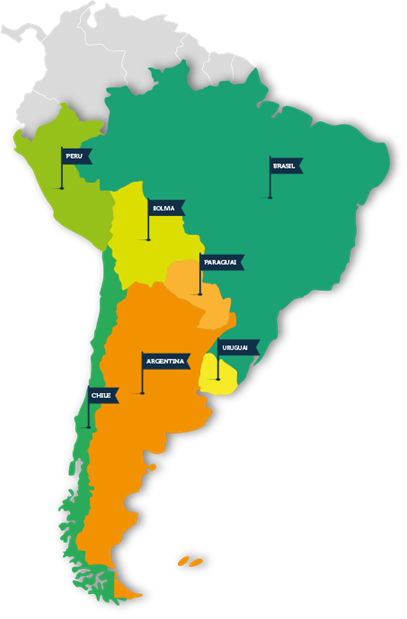
Before talking about who we are, it is important to remember the seeds of our regional dream. Since the 1960s, the Catholic Church has been lighting the way for collaborative ventures all over the world. The awareness that we are all the People of God motivates us to be missionaries and instruments of unity between people and between people and God.
The South America Region is one of the six regions of the Marist Institute, and represents the union of five Provinces – Brazil Centro-Sul, Brazil Centro-Norte, Brazil Sul-Amazônia, Cruz del Sur and Santa María de los Andes – responsible for our mission in seven countries. In 2021, we completed five years of life as a region. Some 432 brothers and more than 30,000 committed laypeople and colleagues are at work in a spirit of harmony and communion, through fraternal dialogue, co-operation, joint efforts and the sharing of people and resources. In total, the Region represents 38% of Marist action in the world and comprises 50% of the people involved in Marist mission.
Our regional faces show our intercultural character
We are Argentinians, Brazilians, Bolivians, Chileans, Paraguayans, Peruvians and Uruguayans who share the same values. People are at the heart of the Region. They are women and men who combine their energies to continue Champagnat’s work.
Interculturality is what we are working towards; it is built on the diversity of countries, languages, experiences, knowledge, histories and social, cultural contexts. Initiatives and projects are triggered by joint actions that get people talking together, inspire ideas, think of alternatives and point towards new horizons for our shared mission.
Lay Marist life in the South America Region
Since the consolidation of the regional structure in 2016, efforts have been made to get to know (again) the initiatives and experiences of and for laypeople in Argentina, Brazil, Bolivia, Chile, Paraguay, Uruguay and Peru. Thus, in 2017, the Regional Vocational Ministry team was formed with the initial objective sharing the experiences of laypeople in each area and to explore possibilities for working together.
Vocation School – a first step
Thus, in 2019, the first Vocation School was held at the regional level. The meeting was attended by approximately 80 people involved in Vocations Ministry from the five Administrative Units/Provinces of the South America Region, as well as guests from the wider Marist Institute.
The initiative sought to provide formation for the participants and to provide opportunities for discussion and in-depth conversations based on regional realities and contexts, on how to consolidate a culture of vocations. The week-long programme was divided into four areas: Marist Life; Theological and Anthropological aspects; Psychological and Spiritual aspects; and life experience. The purpose of this arrangement was to provide vocational accompaniment throughout the week.
There is a proposal to include more stages in the training course. Because of the pandemic, it has had to be conducted on-line.
Current context and the creation of a new venture: Regional Laity Network
In 2021, during one of the most complex periods in history, after five years with many learnings and challenges identified and having discovered new possibilities, it was decided to establish a regional structure to reflect on and create strategies for connecting and learning together about lay Marist life – a Regional Laity Network.
The group seeks to bring together the Lay Marist initiatives of the Region and to foster new ways of engaging in mission for lay Marists. The fact that the initiative was born during a turbulent time and is still in its early days shows the potential for change and resilience present in the project. Organising, planning and building for a new day, following the lead of our founder, Marcellin Champagnat, is a great challenge. The witness of vitality and the charism at work, so evident in the experience of lay Marists, is a beacon of hope for the future.
How many are we?
As can be seen, the lay experience in the Region is very diverse and rich. Because we are a heterogeneous mix of people across Latin America, we have developed many ways of being lay Marists. In all, we are 115 Fraternities of the Champagnat Movement of the Marist Family, 10 mixed Communities of brothers and laypeople, 19 Marist Spirituality Groups and 57 other groups with a lay presence. In these shared spaces, there are 96 Marist Brothers, 782 lay men and 1309 lay women, i.e. a total of 2,187 members.
______________
The content presented here is based on material organized by the Network of Patrimony Centres of the South American Region. The data was updated as of March 2021.
Some guidelines for living Marist spirituality based on the lay vocation
Raúl Amaya Rivera – Director of the Secretariat for the Laity
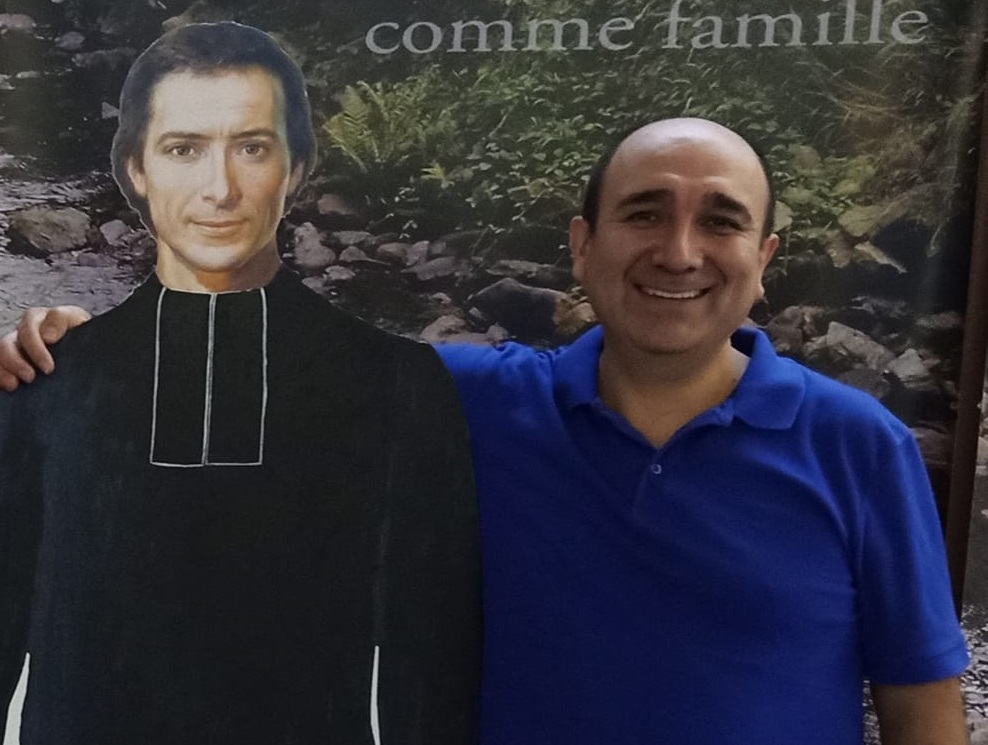
I would like to share with you some ideas about spirituality with the modest desire to open reflection and dialogue and to make a further contribution to continue enriching our journey as lay Marists.
1. Incarnational Christian Spirituality
All of us have a spiritual dimension that we experience differently according to our culture, formation and beliefs. It must be emphasised that spirituality is not the same as religion, nor is religion the patrimony of religions. In fact, any person who lives his or her existence with depth and human quality lives with a certain spirituality that motivates their life, inspires their behaviour and shapes their values and the perspective of their being.
The challenge, then, is to enter our spiritual dimension and become aware of it, for this is the deepest part of our being: our ultimate motivations, our ideal, the passion that animates us, what we give to others, what we offer to society.
Christian spirituality aims at this and places human beings before the ultimate mystery of their existence, invites them to discover the true meaning of life and to make fundamental choices: Who is my God? What is the centre of my life? Where do I place my ultimate hope? How should I act in the world, in my relationships with others?
Christian spirituality is about following Jesus in such a way that his experience of God and his Spirit shape my life. This is the basis of Christian discipleship, and it is what differentiates Christian spirituality from Buddhist, Jewish, Islamic or other spiritualities (Pagola, José Antonio Pagola, Algunas claves de la espiritualidad de Jesús).
So, when we speak of incarnated Christian spirituality, we are talking about the Holy Spirit and his manifestation among us, in my daily life, in society, in my relationships with others and with the world. He is alive in us and comes alive through us. It moves us to follow the God of Jesus and to act accordingly in the world. In Water from the Rock, the Introduction states that “When we speak of spirituality, we mean that unquenchable fire that burns within us, fills us with passion for building the Kingdom of God and becomes the driving force of our lives, allowing the Spirit of Christ to guide us”.
There is no fixed path in Christian spirituality. Each person’s spiritual itinerary is a personal decision and a unique and original adventure, for it is born and nourished by the intimate experience of the encounter with Christ who transforms us. Therefore, if we want to live a living and up-to-date spirituality in our time, we must be very attentive and open to the Spirit who animated Jesus and who personally speaks to us from daily life to our hearts. Hence the importance of discernment and of living experiences that help the development of interiority.
2. Marist Spirituality
Marist spirituality is one of the components of the Marist charism, which is in permanent dialogue with mission and fraternity and is the way in which we Marists (lay people and brothers) live our relationship with God, inspired by the Spirit and which profoundly marks our way of being and proceeding. Agua de la Roca states in its Introduction that “We live Christian spirituality in a particular way: Marial and apostolic. It is an incarnational spirituality that originated with Marcellin Champagnat and developed later among the first Brothers, who passed it on to us as a precious inheritance. The source of our spirituality is the profound spiritual experience that Marcellin Champagnat and the first brothers had in their relationship with Jesus and Mary.
Marist spirituality is Christocentric, Marian and apostolic:
A. Christocentric
Christ is the foundation of our existence as Christians and Marists, which is based on living according to the criteria of Jesus, the incarnate Son of God (abasement) as a man in the midst of humanity (what would Christ do in my place?) and identified with and involved in that which impassioned him and for which he gave his life:
a) the Kingdom of God and his justice;
b) his experience of God as a good Father in whom he fully trusts; and
c) docility to the action of the Holy Spirit who leads him to heal, liberate, empower and improve people’s lives.
B. Marian
We Marists have Mary of Nazareth as a reference for Christian living
a) in her acceptance of the action of the Holy Spirit in her and her complete trust in God,
b) in the values and attitudes with which she lived and in which, as a mother, she educated her son,
c) in her process of discipleship with her son (being the first and most perfect disciple),
d) in the animation of the first community together with the apostles, and
e) in being our companion on our journey who encourages and guides us in following Jesus. She is our sister in faith (Acqua de la Roca, 29).
C. Apostolic
Our spirituality is incarnational and is lived in the midst of the world, in permanent contact with people (Cf. Acqua de la Roca, 124). Marists relate to each other as brothers and sisters to all, and especially to the marginalised and vulnerable. “In the apostolate, like Jesus, we break ourselves and give ourselves to our brothers and sisters. We are truly the bread of life for others, as Jesus was for us” (Acqua de la Roca, 107). The mission of Marists, inspired by Jesus, Mary and Champagnat, is to evangelise through education and to seek to be apostles to young people and children, witnessing through our lives and our presence among them. We also serve their families and society in seeking to make the world more in keeping with the Kingdom of God, announcing the Good News and denouncing and transforming unjust structures. Our apostolic action is communitarian.
3. Some guidelines for living Christian and Marist spirituality from a lay perspective
The spirituality of lay men and women is inserted in the world and is at the service of it, positively valuing nature, society and history as God’s work and as a place for human development, provoking a contemplative and grateful attitude. Furthermore, it promotes human progress through science, culture, technology, politics and other areas through work and social activity for the dignity of all people (John 10,10). It also manifests God’s love through the diversity of lay life options, with special emphasis on marriage and family life.
Based on the above, some keys that can help us to live a more conscious spirituality from the lay state of life are:
- To live with a joyful, prophetic and apostolic attitude, as an active response to the calls of the Spirit in today’s world. We commit ourselves as builders of the Kingdom of God and his justice in the places where we are inserted (family, work, politics, social and cultural life…), being bold and creative in announcing the Good News and denouncing the unjust structures that oppress people, striving to transform them according to the criteria of the Gospel. We do this preferably through education, but also on other possible fronts such as the cultural, political, social… (Evangelii Gaudium).
- Develop interiority, through various means (John 10,10), to better welcome the action of the Spirit in one and to discern where the Spirit is leading me and to act accordingly (The second call of the 22nd GC invites us to “Grow in interiority to be able to discover you as a God of love who manifests himself in the ordinariness of our lives”). The attitude of permanent prayer is fundamental, experiencing different modes of prayer, personal and/or communal, that help us to encounter God and enter into harmony with him.
- Sharing my faith in community, following the example of the first Christian communities and the Marist tradition of fraternity life. This experience embraces all ages, from the earliest years of life to older adults. Marists, in a specific way, are called to live fraternity, to feel that we are brothers and sisters to one another and to always put people first. The youth movements, the Fraternities of the MCHFM, the lay communities, the spirituality groups and so many other manifestations of community life bear witness to the fact that faith is lived and strengthened with others.
- To reflect a Church with a Marian face, where we Marists are called to put into practice the meaning of the Visitation (Church of the apron, mission, service), of Pentecost (Church source of the people, fraternity, community) and of the Annunciation (Beauty will save the world, spirituality – To deepen this key I suggest reading “She gave us the name of Mary” by Brother Emili Turú).
- Living Mary’s values and attitudes incarnated in daily life as a model of following Jesus: servant leadership, attentive listening, discerning heart, boldness and courage in action, social awareness (Magnificat) and openness to the action of the Spirit. Mary’s simplicity of heart and her gentleness inspire and guide us on our spiritual journey.
- Living the traits of the Marist charism as our distinctive way of being followers of Christ in the style of Mary and Champagnat and inculturating the Gospel today: loving presence, trust in God, love of Jesus and his Gospel, in the style of Mary, family spirit, a spirituality of simplicity, love of work (Cf. Marist Educational Mission, 97-123, and Water from the Rock, 15-41).
As lay Marists we aspire to live a spirituality nourished and sustained by the experience of God’s goodness, closeness and unconditional love for all. A spirituality whose passion is the Kingdom of God and his justice, and which follows in the footsteps of Jesus. We make this spiritual journey accompanied by Mary of Nazareth and inspired by Marcellin Champagnat.
For our reflection
- What is it that inspires my way of being and acting? What are the values that move me? From what source do I often drink? What is it that inspires me to live in a certain way?
- What experience of God do I have? Who is God for me? How does He mark my life and my actions?
- What does the Marist charism mean to me? How do I live it out in my daily life? What keys or means help me?
Reflections on Marist life
Esmeraldina Laurinda da Silva – Brasil Centro-Norte

Inspiring experiences in Marist life? Marcellin Champagnat’s experience of spirituality. Starting from the principle that spirituality is a way of being, the answer to this question points to actions that sometimes seem insignificant, but which present great values, whether in the workplace or not, seeking to be a better person every day with others, with the environment, with what one does, and, in my life, I take as an example the lessons that I learnt over the years with Marcellin Champagnat and the Marist Brothers.
To manifest oneself through simple attitudes does not seem to be important, it does not seem to attract attention. But one of the Marist Brothers inspired me to live these values – the (late) Brother Luiz Ângelo with whom I learnt a lot, a man who spoke softly, little, told some stories, gave tickets to the students at break time, listened to people and always responded very frankly, sang and with his simple attitudes, made people feel loved, valued, remembered. Today I am a manager at work, I am a mother, a wife, I am a pastoral worker in the church. And he is an example for me, he had as his first rules simplicity, humility and modesty like Champagnat, attitudes that were the basis for the first Brothers and that continue to inspire Marist managers. To live these virtues is to accept people as they are and to approach them with sincerity and generosity. It is to try to know how they feel, to offer unconditional forgiveness and to always take the initiative of reconciliation. It is also to have a spirit of courage to assume a simple way of living, avoiding consumerism and accumulation of the unnecessary.
I am concerned about the insistence of the theology of prosperity, nowadays much evoked. It is an exercise that confuses the environment by making the interests of capital prevail. It is necessary to be more open to the spirit, that is to say, to think beyond the denomination of faith, to think beyond the walls of our churches and not only to think within the walls of companies or workplaces, looking for production and profit. This is possible when there are provocations, reflections, actions in the simple things of routine.
How do I contribute to the Marist Laity in the world?
Even if it seems contradictory, because the management system has entered a competitive world with values that are not so spiritual, today there is a greater cry for the defence of life and its values in the management of processes, in the work plans, even using appropriate terms of spirituality – such as valuing, caring – that express something perennial – proper to Marist Christian spirituality. The signs of a spiritualised company are perceived through the climate and quality of relationships: empowerment, valuing employees, ethnic, cultural and disability inclusion. I am part of these actions in my work, as a member of human rights, forums for the defence of children, adolescents and young people, in church groups, at home with my children, where I express and defend life. I participate in a group of lay people; I am involved in Marist formations, and I seek to follow Jesus of Nazareth. I am a lay Marist wherever I live.
A garden of flowers, fruits and hope
João Barbosa de Lima Neto – Brasil Centro-Norte
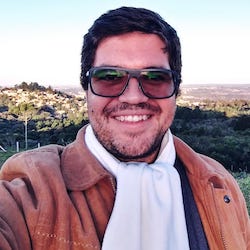
In 1993, at the age of four, I entered the “kindergarten” of the Marist College Pio XII, in Surubim (PE). I entered thanks to the commitment and dedication of my parents: Prof. José Barbosa de Lima and Prof. Marisa Siqueira de Lima, both former Marist students and, at the time of my entry, teachers there.
From Kindergarten to the third year of Secondary School, I was aware that I was living in a place where my development, as a Christian and a citizen, was enhanced not only in class, but above all in the student ministry movements and in the service of art and culture through music.
Living with the Marist Brothers inspired me to understand how to be a Christian capable of being attentive to the signs of the times by living in simplicity, humility and modesty. The life example of Fr. Champagnat and his challenges to our mission as Lay Marists, brought meaning to my life from the moment I entered the “garden”. A garden of dreams, utopias, possibilities, challenges, opportunities and, above all, the garden of the hope of contributing to the education and vocational formation of so many adolescents and young people that we manage to find through Project Connection, in which I act and live my lay Marist vocation as a Vocational Agent. The garden expands along with the service in the Provincial Commission of the Laity, in which we can think and dream of actions that can cultivate the desires of Fr. Champagnat’s desires, inspired by the Good Mother, in the soil of each reality of the units of the Province.
I believe that from the garden of our provincial world we are achieving true beacons of hope, for we are building bridges between the needs of the Institute and the realities of our companions who collaborate with the vitality of the mission, providing itineraries that foster the lay vocation in their gardens of life.
Being a lay Marist: a precious gift
Sara Sánchez Vicuña – Santa María de los Andes, Peru – Coordinator of the Laity Network of the South America Region

Being a Marist is a precious gift I received from the Lord along with life and my family. It defines my identity as a person, as a woman. It guides the choices and decisions that I have made at different times in my life; it impels me to go forward, to undertake and to take risks, to be courageous and to get up whenever necessary, trusting in the Lord; it gives meaning and fullness to my life; it is the cradle of illusions, of dreams and projects.
Being Marist marks my journey of faith, my experience and the answers I have given at different times in my life, even without certainties. As a Marist, as a woman, Mary is my model and companion on the way, the mother who consoles me and encourages me to go forward, to be attentive to others and to be sensitive to the joys and needs of the people with whom I am in contact, to take initiative, to serve and to share from the daily life and simplicity of my day-to-day life and of my home.
I have shared my journey with my brothers and sisters of the Cana community since 2009 (8 lay people and 3 Brothers); we have learned to know, love and accompany each other. Over time I have discovered and become aware that this gift received freely brings with it the responsibility to share it with others and to pass it on to new generations. It is a gift to be put at the service of different instances of mission in which I have participated and continue to participate: in classes with students, in pastoral animation, in the animation of spirituality, in accompanying the journey of the lay communities of Peru, and, recently, in the service of coordination of the nascent Laity Network of the South American Region. A network that dreams of being an instance of reflection, that creates synergy by uniting the riches of each Province and sharing resources and experiences around the journey of the Marist laity and contributes to strengthening communion between brothers and laypeople.
As a lay Marist, I dream that Brothers and lay people will continue to learn to walk together, nourishing ourselves with the charism that unites us and helping us to live intensely our respective vocations; I dream that “wherever there is a brother or a lay Marist” we will share the table of fraternity, we will be infected by the passion to make our mission come alive and we will be signs of communion in the midst of the fragmented and polarised realities that we live in many places. As a fish is not out of water, I do not find myself living any other charism than the Marist charism.
Champagnat as guide and beacon: an account of Flavia’s emotional journey
Flávia de Oliveira Rodrigues Lopes – MCFM de Brasil Centro-Sul
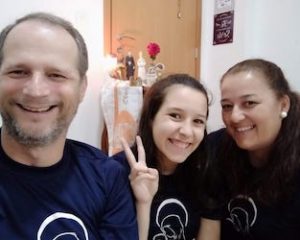
I begin by expressing the joy that our family has in bearing the name of Champagnat. In the year 2000, I had the privilege of being hired to work at the Marist College of Maringá as Cultural Producer. I was welcomed by Brother Luiz Adriano Ribeiro who already at the first meeting said to me: “Do you want to work as a Marist? Then your first task is to read the book, Life of Saint Marcellin which has more than 400 pages. Fearful, I devoted myself to the reading which soon awakened in me a deep appreciation for the stories of Champagnat.
I had the privilege of living with two more “Champagnats” in Maringá: Brother Virgilio, who evangelised everyone with his phrase: “Be happy! And our dear Brother Alfredinho, who enchanted the walks of the College with his songs… Holy men!
I worked for seven years in Maringá, and I had the opportunity of living experiences that were important for my Marist vocational journey. I highlight the Vivemar (Marist Experience), one of the strongest experiences of my faith. I realised that being Marist goes beyond the school walls, our mission is more serious: to give witness in our life to the love of Jesus, especially to those who are most in need, especially young people and children. And the mission becomes more serious and committed because we carry the name of Mary.
I also met my husband at Marist, we got married and we have a beautiful girl, Maria Clara, 15 years old. During my time at Marist, I became more and more enchanted with the charism and more and more invested in my faith by following in Champagnat’s footsteps. At one point, I heard about the Champagnat Movement of the Marist Family (MCFM). I soon fell in love with it, and we started, in Maringá, the Rosey Fraternity, a journey that has lasted until today.
In 2007 I left the College; it was a difficult process, but I was already enchanted by Champagnat, and I was determined that I would carry with me the lessons of my holy educator.
We moved to the city of Curitiba. There were three Fraternities. I remember that I was at the wake of Brother Panini, and I promised: I am going to set up another Fraternity in Curitiba and I am counting on his intercession from heaven. And so it was done, the Fraternity Treasures of Mary was born, with Marist collaborators and former students. We are advised by Brother Ivo Strobino, our rich encyclopaedia on Saint Marcellin.
The more we know, the more we love. I went for my first experience in the Marist Solidarity Mission with my daughter, in the city of Nova Andradina. I like to say that all parents should go with their children for such an experience. Being a source of hope, joy, praying with the families, it was one of the strongest Marist experiences of our life.
The beauty of the Marist charism is that when we really relate to it, we follow a path of constant advancement. We must always go into deeper waters, to cast the net on the other side, to be a beacon of hope where it is turbulent, to be a home of light that emanates hope. I always ask myself: what am I doing with my Marist talent, where am I making this seed bear fruit? And so, it is our mission today as Champagnat Lay Marists.
I am in love with everything that is related to St. Marcellin Champagnat – his life, his letters, his teaching. In my prayers, I talk to him: What would you do? And this is our relationship. They say that saints are stars that guide us to follow in the footsteps of Jesus. Champagnat is the most inspiring star in my life who is always telling me: “Make Jesus Christ known and loved, that is your mission, Flávia!
A continuing story: from school notebooks to Marist life
Sophia Kath – Brasil Sul-Amazônia
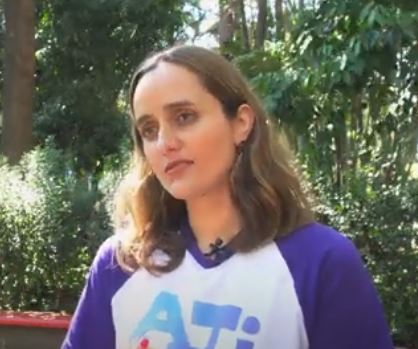
My name is Sophia Kath, I am 29 years old, I am Brazilian, and I live in the south of Brazil, in the city of Porto Alegre, which is part of the Marist Province of Brasil Sul-Amazônia. I am part of the Farol (Beacon) Movement, and I am a l member of the Vagalumes group. I am a journalist, an authority on youth and I work as a Pastoral Agent in the Marist College Rosário.
My Marist journey began in 2002 when I entered the Colégio Marista Rosário as a student. Over a long period of school, I gradually got to know the Marist charism, participating in various activities promoted by the school such as the Marist Youth Ministry, the Volunteer Group, the Student Guild, among others. In 2009, I joined the PUCRS for the journalism course and I approached the Pastoral and Solidarity Centre. I participated in some projects of the Pastoral and, in 2010, I started my professional career, working until 2018 in communication projects and as an Advisor of the Marist Youth Ministry. Also, at PUCRS I worked as a Relationship Analyst in integration projects between the University and the schools, and in 2020, I started working as a youth minister at Colégio Marista Rosário – where I currently work.
Throughout this journey as a student and professional, I have had many significant experiences that have shaped me as a Lay Marist. I think it is also important to highlight the moments of retreat, the Vidamar, which is a formation programme of our Province, the Solidarity Week and the various experiences I had in the MYM. Also, in 2011, I lived through an experience which was very significant, and which opened up my horizons on the Marist mission in the world. I had the opportunity to participate in the International Meeting of Marist Youth in Spain and it was the moment when I began to understand the richness of the cultural diversity that we have as an Institute and how we have different realities in each Province.
My identity as a Lay Marist is still very new to me because, even with a few years of Marist experience, I only became aware of this identity, mainly from the moment I started in the Movimiento Farol. Looking back at my journey, however, I realise that this process began earlier and is the fruit of all the Farolerience experience and people that I have had the opportunity to meet, and I am very grateful for the transformation that they have made in my life.
In 2018, together with some young people from my Province who also had the desire to live Marist spirituality in community, but who did not find in the experience of Laicato already structured in the Province – the Champagnat Movement of the Marist Family – we started some group meetings. It is important to say that it was not a ‘no’ to want to participate in the MChFM, because we respect the whole process carried out by the Fraternities, but we would like something new. We started a young Laicato group, not exactly because of the age, but because of the characteristics observed in the young people. That was a very interesting experience, because we were living by ourselves without having a provincial organisation. At the same time, the Province set up a working group called Young Laicato, which carried out a process of listening and organisation that resulted in the creation of the Movimiento Farol – Marist Youth Life Groups.
Then, since 2019, the group that I participated in joined the proposal of the Movimiento Farol , and with the entry of new people, we chose a name for the group as Vagalumes, which speaks a lot about being light in the spaces in which we live. I am very happy and pleased to be able to live this experience and to see the Movimiento Farol growing in our Province and making sense in the lives of the people who participate. I emphasise that, even during the pandemic, we did not stop holding group and provincial meetings online. Surely, in such difficult times, the Movimiento was one of the spaces of welcome and care that I had.
To talk about how I contribute to the Marist Laity in the world is quite challenging, as I always have the feeling that the various experiences I had as a Marist contribute more to my formation as a person than I can contribute back. But I believe that the Movimiento Farol is a very beautiful new development for our Province and for the Institute. In a special way, I believe in the transformative power of youth and that we have much to contribute in the way we live the charism. I see the potential of each participant in the Movimiento and how much we can contribute to the Institute and to continue to build a better world wherever we are.
Being a lay Marist
Daniela Costa – Cruz del Sur

I am Daniela Costa from Montevideo, Uruguay. I met the Marist Brothers through the adolescent and youth movement Abaré. A few years later I began to be a catechist in the Marist College Juan Zorrilla de San Martín. At present I continue in catechesis, I am a volunteer in the Marist Home Community Education Centre, and I am in the Marist Vocation area of the province.
Through the Brothers I came to know and discover Marcellin Champagnat and his way of following Jesus in Mary’s way. I learnt to know and love Mary in a new way, giving new meaning to her presence in my life, until I also felt her as “my ordinary resource”. Almost without realising it, I embraced this charism, it became part of my life, giving it meaning.
In catechesis, in classes, in the courtyards, in meetings, mainly in poor neighbourhoods; the encounter with others was showing me the Marist style of being in the world, building community, weaving networks, being at the service of the most vulnerable and meeting the God of Jesus alive in so many children, young people and adults who appear on my path to this day.
To be a lay Marist for me is to live my Christian vocation following Jesus in the style of Mary and Champagnat, always with others, building fraternity, with an attentive eye on the simplest events of life and with the confidence that God is the one who acts, the one who builds the house for all.
